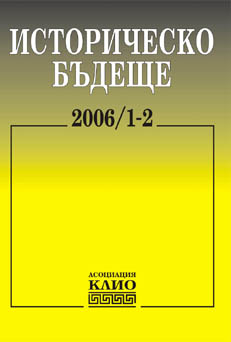Съвременният български политически мит (Въведение към интерпретацията му)
The Contemporary Bulgarian Politicial Myth (An introduction to interpretation)
Author(s): Nikolay PoppetrovSubject(s): History
Published by: Асоциация Клио
Keywords: Bulgarian political myths; political mythology; Bulgarian society; modern Bulgarian state
Summary/Abstract: After the fall of the communist regime Bulgarian historical science recognized the existence of political myths, respectively political mythology. The objective of the text offered is to outline the principal parameters of the „modern political myth“ field of research. Its main characteristics have been outlined as well as the possible typologies. Its genesis, the conditions under which it exists and the milieus that create it have been marked out. Special attention is paid to periodization, which spans the entire period of existence of the modern Bulgarian state from its establishment in 1879. It is underscored that political myths accompany the entire modern development of Bulgarian society. The author notes the possible steps on deconstructing a given political myth with the objective of its comprehensive analysis, including up to its genetic phase. The paper concentrates on the condition of political mythology after the change from the end of the 1980s. It is characterized by the disintegration of the communist myth system and the disappearance of most of the institutional myths extant until then. On the other hand, myths that had lost their topicality over the 45 years of the communist regime underwent a sort of Renaissance. One main trend, however, was the creation of new myths legitimizing and institutionalizing the new political players, the system of view of life and new values imposed. The conclusion arising from the observations of the myth situation in the years of radical change/transition is that society produced myths intensively. In addition to a legitimizing function, they largely filled the insufficient information (and lack of transparency) at the disposal of society, structured the knowledge of the world and launched acceptable explanations about events and processes in the years of transition. The myths reflected fundamental themes on the public agenda.
Journal: Историческо бъдеще
- Issue Year: 2006
- Issue No: 1-2
- Page Range: 3-29
- Page Count: 27
- Language: Bulgarian
- Content File-PDF

